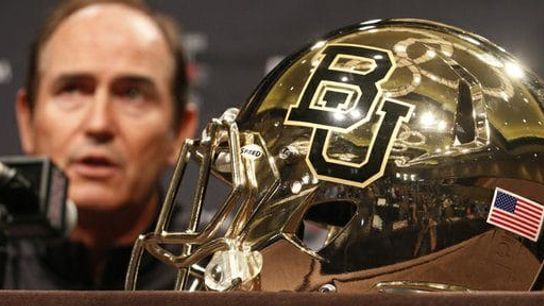12:07 p.m. ET Update: A report from KCEN-TV in Waco corroborates Brown's report, stating "there were plans in place" to bring Briles back for the 2017 season, adding that players were informed of the plan and "there's an unbelievable amount of pressure on the board right now." Stay tuned.
Update:A report from Dan Wolken of USA Todayindicates a "small minority" of regents is indeed pushing to eventually reinstate Briles, but that faction is unlikely to win out in the end.
In light of that, it's possible a member of the anti-Briles majority spoke with Brown in hopes of smoking out the pro-Briles majority. We'll have to wait and see.
Original report below:
When Baylor dismissed Art Briles late last month, the official language the school's Board of Regents used was "suspended with intent to terminate." Those five words allowed the school some wiggle room, and a report from Chip Brown of Horns Digest indicated Baylor's board may attempt to use it.
As Brown writes, the Board will vote today whether or not to hit Briles with a one-year suspension and then bring him back in 2017. It's unclear whether or not Briles has the votes necessary among the 34-member board to return to the school, but Brown writes the school's biggest money supporters want him back.
The school's handling of its ongoing rape crisis has been curious at best since the dismissals of Briles, AD Ian McCaw and president Ken Starr, from declining to elaborate further than Pepper Hamilton's 13-page summary to this:
From Brown's report: There are those among the Baylor leadership who feel the major failings of the BU rape scandal fall on former president Ken Starr for the school not having a Title IX coordinator from 2011-2014, sources said. If BU had a Title IX coordinator, the football coaching staff would have had training on how to handle any complaints of rape made against football players, sources said. And this quote from Texas Rangers co-owner Bob Simpson:
Bringing Briles back would be a spectacularly bad public relations move and affirmative indication the school does not plan to change a culture within a football program that the board, at one time, felt necessary to dismiss its championship-winning, program-saving coach. From the Pepper Hamilton report:
Baylor failed to take appropriate action to respond to reports of sexual assault and dating violence reportedly committed by football players. The choices made by football staff and athletics leadership, in some instances, posed a risk to campus safety and the integrity of the University. In certain instances, including reports of a sexual assault by multiple football players, athletics and football personnel affirmatively chose not to report sexual violence and dating violence to an appropriate administrator outside of athletics. In those instances, football coaches or staff met directly with a complainant and/or a parent of a complainant and did not report the misconduct.As a result, no action was taken to support complainants, fairly and impartially evaluate the conduct under Title IX, address identified cultural concerns within the football program, or protect campus safety once aware of a potential pattern of sexual violence by multiple football players.
In addition, some football coaches and staff took improper steps in response to disclosures of sexual assault or dating violence that precluded the University from fulfilling its legal obligations. Football staff conducted their own untrained internal inquiries, outside of policy, which improperly discredited complainants and denied them the right to a fair, impartial and informed investigation, interim measures or processes promised under University policy. In some cases, internal steps gave the illusion of responsiveness to complainants but failed to provide a meaningful institutional response under Title IX. Further, because reports were not shared outside of athletics, the University missed critical opportunities to impose appropriate disciplinary action that would have removed offenders from campus and possibly precluded future acts of sexual violence against Baylor students. In some instances, the football program dismissed players for unspecified team violations and assisted them in transferring to other schools. As a result, some football coaches and staff abdicated responsibilities under Title IX and Clery; to student welfare; to the health and safety of complainants; and to Baylor’s institutional values.
In addition to the failures related to sexual assault and dating violence, individuals within the football program actively sought to maintain internal control over discipline for other forms of misconduct. Athletics personnel failed to recognize the conflict of interest in roles and risk to campus safety by insulating athletes from student conduct processes. Football coaches and staff took affirmative steps to maintain internal control over discipline of players and to actively divert cases from the student conduct or criminal processes. In some cases, football coaches and staff had inappropriate involvement in disciplinary and criminal matters or engaged in improper conduct that reinforced an overall perception that football was above the rules, and that there was no culture of accountability for misconduct.
If Briles does not have the votes to return as coach, Brown writes the school would negotiate a settlement on his eight-year, $40 million contract to a payment between $15 million and $25 million.
In the interim, former Wake Forest head coach Jim Grobe has been hired to a one-year contract to lead the program for the 2016 season while Briles' entire staff has remained on with the program. Whether or not Briles could re-join them is now, unthinkably, back on the table.
